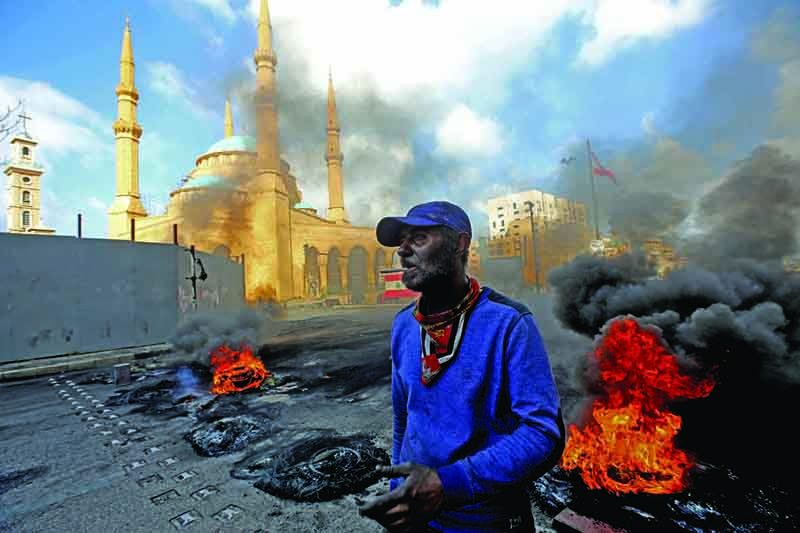 BEIRUT: A man stands next to flaming tires at a make-shift roadblock set-up by anti-government demonstrators next to the Mohammed Al-Amin Mosque in the Martyrs' Square in the center of Lebanon's capital Beirut yesterday during a protest against the deteriorating value of the local currency and dire economic and social conditions. – AFP
BEIRUT: A man stands next to flaming tires at a make-shift roadblock set-up by anti-government demonstrators next to the Mohammed Al-Amin Mosque in the Martyrs' Square in the center of Lebanon's capital Beirut yesterday during a protest against the deteriorating value of the local currency and dire economic and social conditions. – AFP
BEIRUT: Demonstrators blocked key roads across Lebanon yesterday in protest at the country's political paralysis after the Lebanese pound hit record lows on the black market. Black smoke billowed up from overturned rubbish dumpsters and tires set ablaze by protesters at various entrances to Beirut from the early morning. Lebanon is in the grips of its worst economic crisis in decades, compounded by the coronavirus pandemic.
The value of the Lebanese pound has plunged by more than 80 percent, sending pricing soaring, and more than half the population are living below the poverty line. "We've closed off all the roads today to tell everyone: It's over, we have nothing left to lose. We've even lost our dignity," said Pascale Nohra, a protester blocking the northern road into Beirut. She said it was time to revive the mass cross-sectarian protests of late 2019 against the political class.
"We want everybody to show solidarity and come out on the street to demand their rights. The economic crisis touches all Lebanese and religious sects," said the former worker in real estate. "We need to return to the streets and revive our revolution," she said. The value of the local currency has hovered at an all-time high of nearly 11,000 pounds to the greenback on the black market in recent days, even though the official exchange rate remains 1,507.
Lebanese fear the government will soon lift food subsidies, and footage has circulated of fighting over cheaper, subsidized baby milk in a supermarket. Mohammad Faour, a research fellow in banking and finance at University College Dublin, said the pound's ongoing free fall was "a mere continuation of a clear downward trend in the exchange rate since the very beginning of the crisis, and the concurrent policy inaction". The protests came on the same day as Lebanon entered a new phase in easing up a lockdown to keep COVID-19 infection rates in check.
Lebanon has been without a fully functioning government since a massive blast in Beirut last summer than killed more than 200 people and ravaged swathes of the capital. The government stepped down after the disaster, but a deeply divided political class has since failed to agree on a new cabinet to replace it.
Money running out
In a country that imports 80 percent of its food, much of the six million population depends on subsidies to get by. Even without them being lifted, many are already struggling, said Beit El Baraka founder Maya Ibrahimchah. "There have been many more demands for help over the past four months," she said. "Those we are helping today are all from the middle class." The state has poured up to $437 million into subsidies a month, the World Bank estimates, to keep prices in check for bread, medicine, fuel and electricity, as well as around 300 other items since mid-2020.
To counter the pound's drastic devaluation, importers get access to dollars at a preferential rate to ensure they can afford to continue bringing in supplies. For flour, fuel and medicine, for example, they offer dollars at the official exchange rate of 1,507 pounds to cover most of their cost. But traders must resort to the black market to cover the difference, where Tuesday the rate hit a record low of 10,000 pounds to the dollar. As a result, in less than a year the price of a large bag of subsidized bread has risen from 1,500 to 2,500 pounds.
Authorities have remained vague about how the subsidies will be reduced, though meetings are ongoing. In early December, central bank governor Riad Salameh said it could only fund subsidies for another two months. Later that month, he said two billion dollars were available for them. At the end of February, the central bank's website showed it had $17.9 billion in foreign currency reserves, yet $17.5 billion of that is the bank's required reserves.
The bank did not respond to AFP's repeated requests for comment. The UN food agency has warned any subsidy reduction would have "major inflationary repercussions" and "put an unbearable strain on households". The price of bread could increase by up to three times and fuel by 4.5 times, the World Food Programme said, adding it was critical to immediately scale up assistance to the poorest. - AFP




